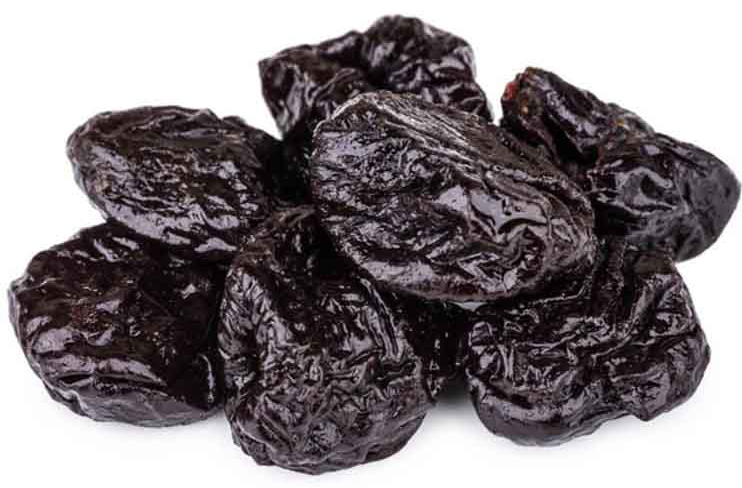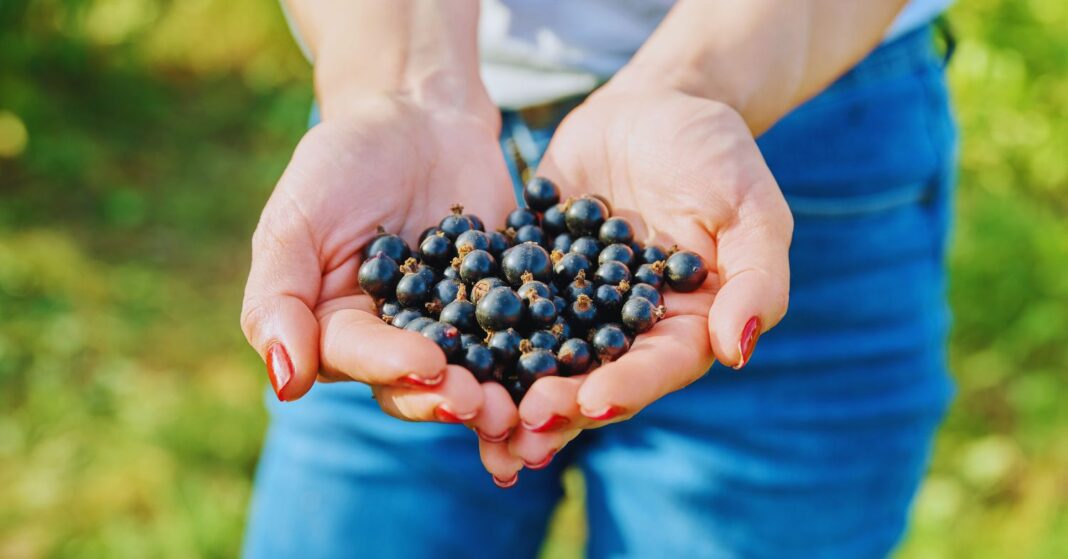NOW HERE’S A SURPRISE!
As we age, our bones lose density and become more fragile, putting us in danger of breaks and fractures. It’s a condition called osteoporosis and while it should not be lost sight of that aging men also suffer from it, this is a particular concern among post-menopausal women, who generally have much greater losses in bone density than men in their age group.
In fact I learned years ago that more women die of fracture of the femur (osteoporosis, weak bones) than die of breast cancer!
Ock Chun, professor of nutritional sciences in The University of Connecticut’s College of Agriculture, Health, and Natural Resources, has been working with blackcurrant, a tart berry, for years, investigating its potential to ameliorate a host of conditions including postmenopausal bone loss and osteoporosis.
Chun previously led a study showing that in mice, blackcurrant supplements helped prevent bone density loss post-menopause. This study showed that the best time for intervention was in the transition between pre- and post-menopause before bone loss has significantly progressed.
With these findings in hand, Chun and her team wanted to see if they would translate to a human population.
They recently published their findings demonstrating blackcurrant’s protective effects against bone density loss in the Journal of Nutritional Biochemistry.1
Forty peri- and early post-menopausal participants between the ages of 45 and 60 took capsules of blackcurrant powder daily for six months. Participants were randomly assigned to either take one capsule, two capsules, or a placebo. Each capsule was 392 milligrams.
The researchers found that the supplements prevented the loss of whole-body bone mineral density. The group that took two capsules actually showed overall increases in bone mineral density at the end of the six-month trial period.
The researchers looked at changes to the gut microbiome and immune system, which interact to play a key role in bone metabolism.
Down With RANKL!
They found that the blackcurrant supplements decreased levels of proteins called interleukin-1 beta and RANKL. Interleukin-1 beta stimulates the expression of RANKL which causes bone resorption and thus a decrease in bone density.
So it is very important to reduce levels of RANKL, which the study did. RANKL is the abbreviation for receptor activator of nuclear factor kappa beta ligand. It is also commonly referred to as osteoprotegerin ligand (OPGL) or osteoclast differentiation factor (ODF) or TNF related activation-induced cytokine (TRANCE).
Listen… don’t worry about all those daft names! Haha! We’ll stick with RANKL. And remember: it increases bone resorption, which is a BAD THING.
So it is a GOOD THING when blackcurrant berry extract significantly reduces RANKL, in a direct dose-related response, after just 6 months.
Taking the blackcurrant supplements also increased a bacteria found in the gut microbiome called Ruminococcus 2. This led the researchers to infer that it could be one of the bacteria driving the protective effects blackcurrant has on bones.
Interestingly, science shows this particular bacterium has a lot going for it. It appears to protect against sarcopenia (muscle loss); osteoporosis (bone loss); Crohn’s disease; lower serum levels of alanine, valine, leucine, isoleucine, proline, tryptophan and ornithine; infections and hospitalization for complications of cirrhosis.2
In fact one article suggested it might be classified as a probiotic! The Ruminococcus bacteria in our gut play a major role in helping us digest resistant starches, producing butyrate. The slow digestion of these particular carbohydrates by Ruminococcus has been linked to many health benefits such as reversing infectious diarrhea and reducing the risk of diabetes and colon cancer.3
Out With Bisphosphonates
Typical of the pharmaceutical industry, they have come up with a dangerous and ineffective treatment for osteoporosis, which they have tried to establish as the “standard of care.”
Drugs like Fosamax, which are pushed on women, do little or no good. But they do have serious side-effects. For instance, jaw bone necrosis. Plus they cause fractures of the femur, which is the exact opposite of what you would expect if bone density really was increased.
Other side effects include abdominal pain, skin rashes (including blistering), red eyes and tearing up, trouble breathing and swollen joints.
How much nicer to munch on a natural fruit!
You can add blackcurrants to your smoothies, make purees, even eat blackcurrant jam – but sugar-free only! The French brand Maman (Mummy) is widely available in the USA and elsewhere but it must be kept in the refrigerator.
DON’T CONFUSE THIS FRUIT WITH BLACKBERRIES, THEY ARE DIFFERENT.
Got Prunes?
While we are on the topic of natural solutions to bone loss, how about prunes? I came across an interesting article in the journal Osteoporosis International (2024)4 which found prunes had similar benefits to blackcurrants (notice the dark colors, by the way).
“This is the first randomized controlled trial to look at three-dimensional bone outcomes with respect to bone structure, geometry and estimated strength,” said lead author Mary Jane De Souza, distinguished professor of kinesiology and physiology at Penn State. “In our study we saw that daily prune consumption impacted factors related to fracture risk. That’s clinically invaluable.”
 There is more to prunes than just a laxative effect
There is more to prunes than just a laxative effect
To see whether daily prune consumption influenced bone quality, the research team conducted a 12-month randomized controlled trial with 235 postmenopausal women. Participants were assigned to one of three groups: no prunes; 50 grams (4 to 6) prunes daily; or 100 grams (10 to 12) prunes daily. Every six months, the participants were assessed using a peripheral quantitative computed tomography scan, which allows for cross-sectional imaging to measure 3D bone mass density, bone geometry and bone strength.
Over the course of one year, the researchers found that measures of bone mass density and bone strength in the tibia (shin bone) all decreased in women in the control group. In contrast, those who ate at least four to six prunes every day maintained bone density and bone strength and preserved bone structure, particularly in cortical bone.
While women in both prune groups saw benefit, four to six prunes a day may be the more feasible dose. Women in the 10 -12 prunes a day group dropped out, due to boredom with the quantities required!
Yet another prune study showed significant reductions in inflammatory cytokines, which are proteins that help control inflammation, and activated monocytes, which are a major type of immune cell that has been shown to drive the chronic inflammatory response when 50 to 100 grams of prunes (about 5-12 prunes) are included in the diet, daily.
Specifically, reductions were seen in Tumor Necrosis Factor-? following 50 grams of daily prune intake, and reductions in Interleukin-1?, Interleukin-6, Interleukin-8 secretions, as well as activated monocytes, with 100 grams of prune intake, compared to diets without prunes.5
All of this is great for bone issues, as well as general health.
“These findings may be attributed to the abundance of bioactive compounds found in prunes, including vitamins, minerals, phenolic acids and polyphenols, which are likely acting synergistically to suppress activated monocytes and their secretion of bone-resorptive inflammatory cytokines,” said Co-author Connie Rogers, Ph.D., MPH, Professor and Department Head, Department of Nutritional Sciences, University of Georgia.
This is really the science of “food as medicine”! Good ‘ol Hippocrates…
To Your Good Health,Prof. Keith Scott-Mumby
The Official Alternative Doctor
Sources:
- Nosal, B. M. et al. Blackcurrants shape gut microbiota profile and reduce risk of postmenopausal osteoporosis via the gut-bone axis: Evidence from a pilot randomized controlled trial, Journal of Nutritional Biochemistry (2024). DOI: 10.1016/j.jnutbio.2024.109701
- [JHEP Rep. 2022 Oct 29;5(1):100619. doi: 10.1016/j.jhepr.2022.100619. eCollection 2023 Jan]
- [https://live-biotherapeutic.creative-biolabs.com/ruminococcus-spp.htm#]
- Kristen J. Koltun et al, Prunes preserve cortical density and estimated strength of the tibia in a 12-month randomized controlled trial in postmenopausal women: The Prune Study, Osteoporosis International (2024). DOI: 10.1007/s00198-024-07031-6
- Janhavi J. Damani et al, Prune Consumption Attenuates Proinflammatory Cytokine Secretion and Alters Monocyte Activation in Postmenopausal Women: Secondary Outcome Analysis of a 12-Mo Randomized Controlled Trial: The Prune Study, The Journal of Nutrition (2023). DOI: 10.1016/j.tjnut.2023.11.014






